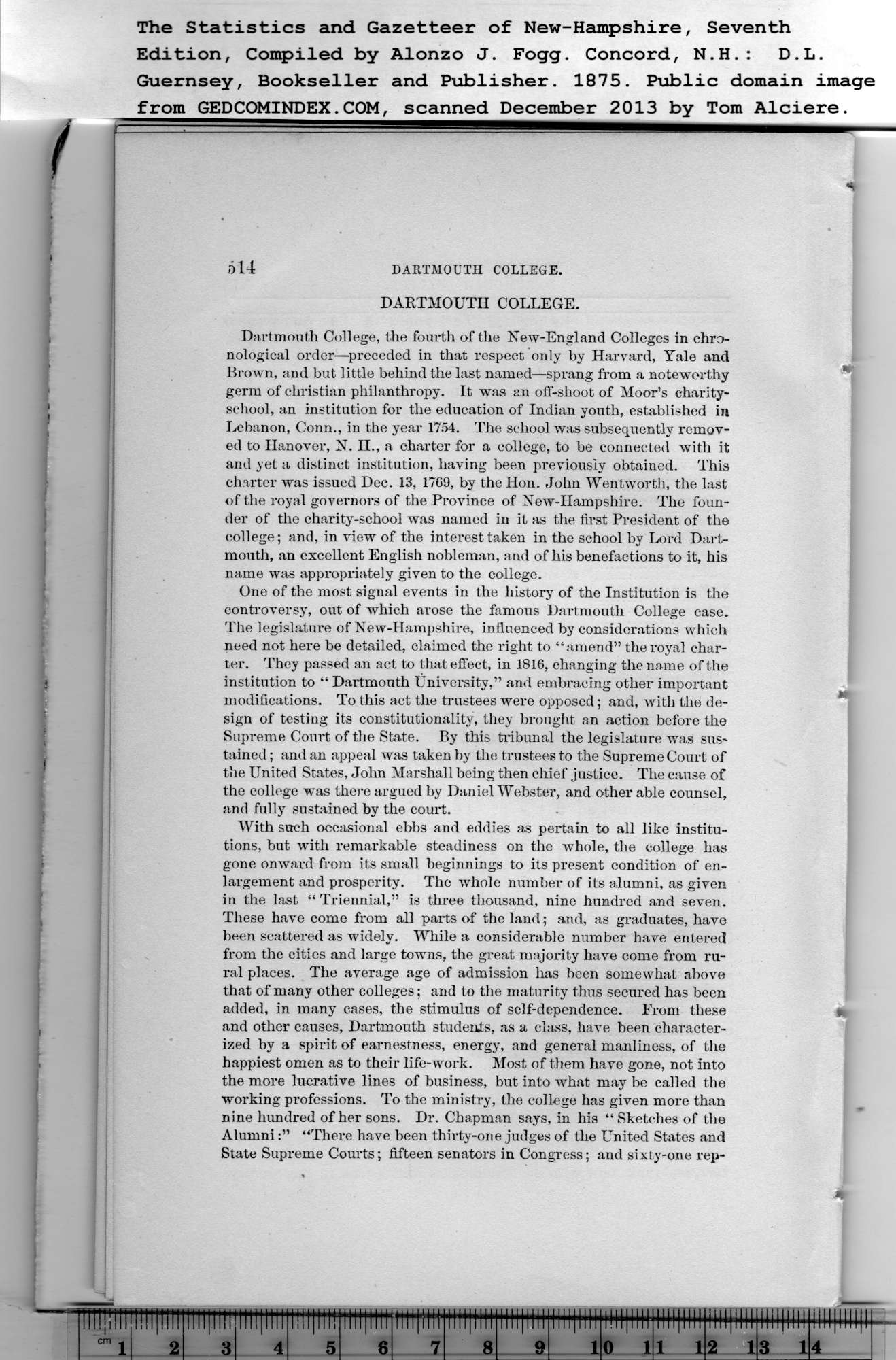|
514 DARTMOUTH COLLEGE.
DARTMOUTH COLLEGE.
Dartmouth College, the fourth of the New-England Colleges in chro-
nological order—preceded in that respect only by Harvard, Yale and
Brown, and but little behind the last named—sprang from a noteworthy
germ of Christian philanthropy. It was an off-shoot of Moor’s charity-
school, an institution for the education of Indian youth, established in
Lebanon, Conn., in the year 1754. The school was subsequently remov-
ed to Hanover, N. II., a charter for a college, to he connected with it
and yet a distinct institution, having been previously obtained. This
charter was issued Dec. 13, 1769, by the Hon. John Wentworth, the last
of the royal governors of the Province of New-IIampshire. The foun-
der of the charity-school was named in it as the first President of the
college; and, in view of the interest taken in the school by Lord Dart-
mouth, an excellent English nobleman, and of his benefactions to it, his
name was appropriately given to the college.
One of the most signal events in the history of the Institution is the
controversy, out of avhich arose the famous Dartmouth College case.
The legislature of New-Hampshire, influenced by considerations which
need not here be detailed, claimed the right to “amend” the royal char-
ter. They passed an act to that effect, in 1816, changing the name of the
institution to “ Dartmouth University,” and embracing other important
modifications. To this act the trustees were opposed; and, with the de-
sign of testing its constitutionality, they brought an action before the
Supreme Court of the State. By this tribunal the legislature was sus-
tained ; and an appeal was taken by the trustees to the Supreme Court of
the United States, John Marshall being then chief justice. The cause of
the college was there argued by Daniel Webster, and other able counsel,
and fully sustained by the court.
With such occasional ebbs and eddies as pertain to all like institu-
tions, but with remarkable steadiness on the whole, the college has
gone onward from its small beginnings to its present condition of en-
largement and prosperity. The whole number of its alumni, as given
in the last “ Triennial,” is three thousand, nine hundred and seven.
These have come from all parts of the land; and, as graduates, have
been scattered as widely. While a considerable number have entered
from the cities and large towns, the great majority have come from ru-
ral places. The average age of admission has been somewhat above
that of many other colleges; and to the maturity thus secured has been
added, in many cases, the stimulus of self-dependence. From these
and other causes, Dartmouth students, as a class, have been character-
ized by a spirit of earnestness, energy, and general manliness, of the
happiest omen as to their life-work. Most of them have gone, not into
the more lucrative lines of business, but into what may be called the
working professions. To the ministry, the college has given more than
nine hundred of her sons. Dr. Chapman says, in his “ Sketches of the
Alumni:” “There have been thirty-one judges of the United States and
State Supreme Courts; fifteen senators in Congress; and sixty-one rep-
PREVIOUS PAGE ... NEXT PAGE
This page was written in HTML using a program written in Python 3.2
|
